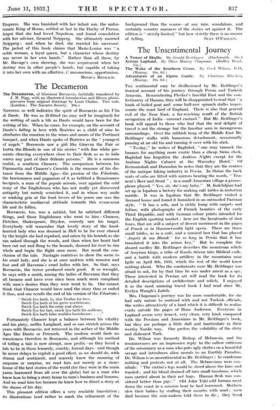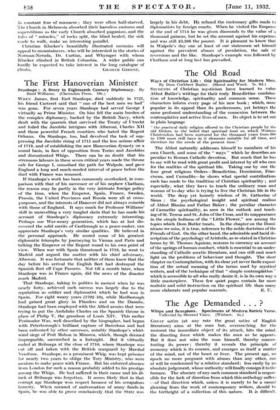The Unsentimental Journey
The Wake of the Southern Cross. 13y C.twil Wilson, MD, (Murray. 10s. 6d.) Adventures of an Alpine Guide. By Christian Elms-tee. (Murray. 10s. Od.) Tim sentimental may be disillusioned by Mr. Reitlinger's ironical account of his journey through Persia and Turkish Armenia. Remembering Meeker's fanciful East and the eon- fectionery of Hassan, they will be disappointed to read that "a hunk of boiled goat and some half-raw spinach stalks imper- sonate the roast beef of England. There is also that general evil of the Near East, a far-reaching result of the British occupation of India—caramel custard." But Mr. Reitlinger's book will appeal to those who find that the real delight of travel is not the strange but the familiar seen in incongruous surroundings. Over the rubbish heap of the Middle East Mr.. Reitlinger stalks with humorous detachment, occasionally pausing at an old tin and turning it over with his stick.
"To-day," he writes of Baghdad, "one may ransack the bazaars for anything more exotic than a cheap Swiss clock. Baghdad has forgotten the Arabian Nights except for the Arabian Nights Cabaret at the Waverky Hotel." Of Kermanshah and Hamadan he notes that they are the centres of the antique faking industry in Persia. In Shiraz the back scats of cabs are fitted with mirrors bearing the words, " Ten- nent's Beer and Stout" ; in a moan Armenian village a gramo- phone played, " Yes, sir, she's my baby." M. Kalebdjimm had set up in Ispahan a factory for making café tables its imitation marble. It was in Ispahan that Mr. Reitlinger visited a licensed house and found it furnished in an outmoded Parisian style. " It has a sofa, and is richly hung with carpets and kelims, with photographs of French beauties of the early Third Republic, and with German colour prints intended for the English sporting market: here are the hecatombs of shot foxes, that are still a subject of decent merriment in the pages of Punch or in Hammersmith light opera. There are three small tables, as in a café, and a musical box that has played Aupres de ma Blonde' for so long in Persia that it has translated it into the minor key." But to complete the absurd medley Mr. Reitlinger describes the monstrous reliefs of Assyrian kings, a tribe of Kurds driven into Biblical exile, and a battle with modern artillery in the mountains near Igdir on April nth, Mt, which the rest of the world knew nothing about. Who the combatants were Mr. Reitlinger was afraid to ask, for by that time he was under arrest as a spy. Those interested in Persian art will read the book for its detailed descriptions of architecture and reliefs. I enjoyed it as the most amusing travel book I had read since Mr. Evelyn Waugh's Labels.
Mrs. Chapman's journey was far more comfortable, for she had only nature to contend with and not Turkish officials. She writes attractively of a land which it is difficult to realize exists outside the pages of Hans Andersen. Everyone in Lapland seems very honest, very clean, very kind, compared with the Persians and Armenians in Mr. Rcitlinger's book, but they are perhaps a little dull and inarticulate in their worthy Nordic way. One prefers the volubility of the dirty and dishonest Turk.
Dr. Wilson was formerly Bishop of Melanesia, and his reminiscences are an impressive reply to the callow criticism of the missionary as a man who puts ugly clothes on a beautiful - savage and introduces alien morals to an Earthly Partulise. Dr. Wilson is as unsentimental as Mr. Reitlinger ; he condemns nothing and protests not at all. The Melanesians were can- nibals "The victim's legs would be sliced above the knee and roasted ; and his blood drained off into small bamboos, which men carried about in their net bags. Human flesh was eon- sidered better than pigs'." Old John Taki sold human meat down the coast in a omission boat he had borrowed. Mothers slew their babies by stuffing their mouths with mud ; men died because the rain-makers told them to die ; they lived in constant fear of massacre ; they were often half-starved. The Church in Melanesia absorbed their harmless customs and superstitions as the early Church absorbed paganism, and the tales of "miracles," of rocks split, the blind healed, the sick made to walk, make an interesting parallel.
Christian Klucker's beautifully illustrated memoirs will appeal to mountaineers, who will be interested in the stories of Norman-Neruda, Dr. Curtius, and Whymper with whom Klucker climbed in British Columbia. A wider public can hardly be expected to take interest in the long catalogue of



































 Previous page
Previous page